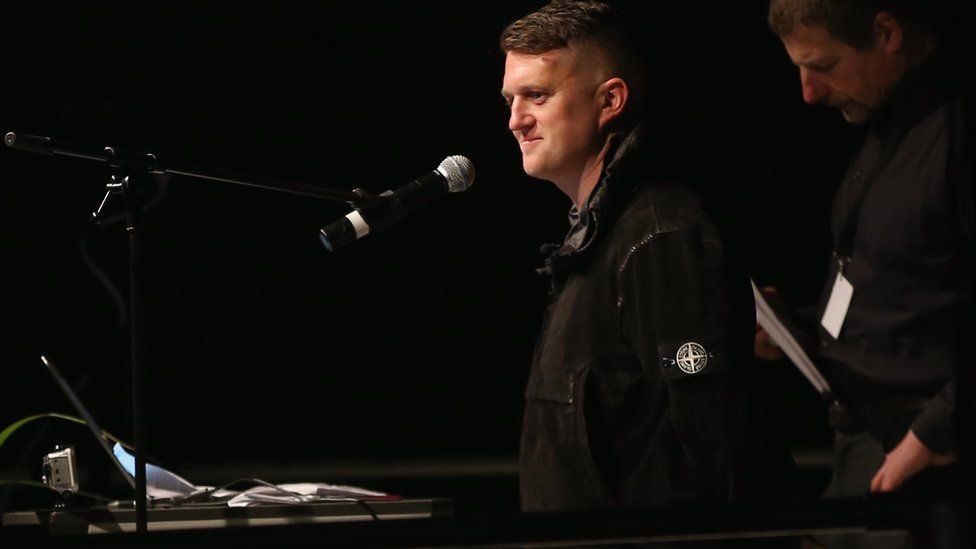Tommy Robinson: The man behind the British version of Pegida
- Published

English Defence League founder Tommy Robinson is now the UK co-ordinator for the anti-Islamist movement Pegida, which is launching next week in Britain.
It's the latest twist in Robinson's controversial life.
Robinson's eventful career has seen him briefly embrace anti-extremist think tank Quilliam and serve jail sentences for mortgage fraud and a passport offence.
In the city of Dresden, where "anti-Islamisation" group Pegida originated, weekly demonstrations attract thousands of middle-class Germans.
Now, 33-year-old Robinson is hoping the movement can attract a similar demographic in Britain, in contrast to the EDL, whose events became notorious for loutish behaviour and alcohol-fuelled violence.
Standing outside Birmingham International railway station, eight miles from the city centre, at the site of Pegida's planned inaugural protest next month, Robinson says: "This is going to be different from the EDL demos.
"We're isolated, away from pubs. We are going to walk from here in silence because now we are trying to create a passive resistance to what's happening.
"We are taking the whole football culture, which was embedded in the EDL, out of it and we are trying to create a safe environment," he adds.
Robinson founded the EDL in 2009, after Islamist extremists shouted abuse at troops during a march in his home town of Luton.
But after recent visits to Pegida demos in Dresden and Cologne, Robinson now reflects ruefully on the organisation he used to lead.
"After going out to Germany, I felt ashamed of the way we'd conducted ourselves as Englishmen," he says.
"I stood there in Dresden and spoke to 40,000 people. There was no aggression. They had discipline. There was unity."
Robinson promises that when Pegida march, anyone who shouts or shows any sign of aggression will be removed.
But while the tactics may have changed, Robinson's fiercely anti-Islamic views show no sign of having mellowed.
He's calling for a halt to all immigration by Muslims, the closure of religious Sharia courts, a ban on the wearing of the burqa in public, and an end to the building of new mosques.
Suggest that any of these ideas might be considered extremist, and he bridles. "If people wish to be a religious Muslim inside their home, then fine," he says.
"I'm not saying that I want Muslims to leave the UK. I'm not saying I want to abolish the mosques that are already here."
Instead, he demands greater integration, and compares Muslims unfavourably to other minority groups such as Sikhs, who he says have integrated more successfully into British society.
"My friend sent pictures from a gurdwara where all the kids were celebrating St George's Day - that's integration. I think every mosque in this country should fly the flag of St George. I'd love to see it but unfortunately they won't."
Find out more
Listen to The Report, presented by Adrian Goldberg (right) on BBC iPlayer Radio
From Robinson's perspective, the extremist views represented by groups such as the so-called Islamic State are indistinguishable from devout Islam, even though numerous mainstream Muslim organisations have condemned the jihadists and their interpretation of the Koran.
Given his outspoken views, it came as a shock to his supporters when in October 2012, Robinson quit the EDL and joined forces with the think tank Quilliam, which seeks to combat extremists.
He explains that the decision came after a lengthy spell in solitary confinement - where he says he was being kept for his own safety - during a jail sentence for using someone else's passport to enter the US.
At the time, he admits he was on the verge of a breakdown because of fears over his mother's health, and a series of death threats.
"Going to prison saved my life," he says. "I didn't have a chance to look at myself until I spent 22 weeks in solitary confinement."
"It gave me time to really evaluate where I was. And I was a bad dad, I was a bad husband, I was a horrible person at that time.
"Now I've had time out, I want to see my children grow up, I want to be there," he emphasises.
Robinson is no longer active in Quilliam and he is seeking to revive the fortunes of Pegida. A previous launch attempt in the UK last year, with which Robinson wasn't involved, fizzled out.
The latest initiative is not being welcomed in Birmingham.
Waseem Zaffar, a councillor for the inner city Lozells ward, wants the Pegida march banned and accuses Robinson to his face of "spreading hate" and "causing division".
"Some of the rhetoric and divisive stuff that you talk about really threatens the harmony of communities such as Lozells," Zaffar says.
"By criticising Islam and pointing the finger at Islam with the distorted view that you've got you are inciting racial hatred towards a particular section of society.
"Spreading hate and fear and marching up and down our streets... the aggressive nature of doing that does not help," he adds.
Former Respect Party leader Salma Yaqoob accuses Robinson of scapegoating Muslims, which will drive some into the arms of extremists.
"It's opportunistic. He is fear-mongering," Yaqoob argues.
And Yaqoob doesn't believe Robinson has changed.
"Tommy says he is not against Muslims but every time you look what Tommy is up to it's about something against Islam and Muslims," Yaqoob says.
I can't help but be a bit sceptical as to what his motivation is."
Robinson shrugs off the criticisms.
"We have isolated and ghettoised communities who are Muslim. We have terrorists. We have big problems with sexual exploitation from Muslim gangs," he says.
"So someone has to at some point stand up and say enough is enough."
Subscribe to the BBC News Magazine's email newsletter to get articles sent to your inbox.